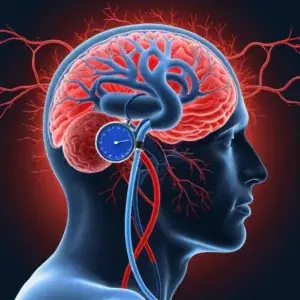Table of Contents
Cognitive decline is an unavoidable feature of aging, but new research suggests that there are effective ways to slow it down. Millions of people worldwide suffer from neurodegenerative disorders like Alzheimer’s, which can have a significant influence on their quality of life. Addressing cognitive decline by proactive lifestyle changes is critical, regardless of whether one is at risk for Alzheimer’s or another type of dementia.
Understanding Cognitive Decline
Cognitive decline occurs as a result of neurodegenerative disorders, which are a group of ailments defined by progressive degradation of the neurological system. Alzheimer’s disease is the most common, affecting around 6 million people in the United States. This figure represents around 2% of the overall population, demonstrating the disease’s tremendous impact.
Alzheimer’s disease
Alzheimer’s disease is the major cause of dementia, with age being the most significant risk factor. However, other types of dementia, such as mild cognitive impairment and pre-dementia, contribute to the overall spectrum of cognitive loss.
Other Neurodegenerative Diseases.
Other significant neurodegenerative disorders include Lewy body dementia, which shares traits with both Alzheimer’s and Parkinson’s diseases, as well as Parkinson’s disease, which is becoming increasingly common. Furthermore, disorders such as multiple sclerosis, ALS, Huntington’s disease, and vascular dementia, while less frequent, are just as severe.
Key Risk Factors for Cognitive Decline
While age is still the largest non-modifiable risk factor for neurodegenerative illnesses, recognizing and controlling genetic predispositions can significantly reduce risk.
Age: Aging is a universal risk factor for disorders such as glaucoma, cardiovascular disease, and cancer, thus it is critical to understanding cognitive decline.
Genetics: Alzheimer’s disease is strongly associated with the ApoE gene. The ApoE4 isoform is particularly related with an increased chance of developing the condition, albeit this is not predictable. Other rare but deterministic genes, including PSEN1, PSEN2, and APP, are known to cause early-onset Alzheimer’s.
Mechanisms and Pathology of Cognitive Decline
Amyloid beta, a protein that creates plaques in the brain, has been a hot topic in Alzheimer’s research. However, its relevance is debatable, as some people with high amounts of amyloid plaques do not experience cognitive impairment. This complexities highlight the need for a more comprehensive approach to studying and treating Alzheimer’s disease.
Modifiable Risk Factors to Slow Cognitive Decline
Focusing on modifiable risk factors can significantly influence brain health and slow cognitive decline.
Sleep
Adequate sleep is essential for cognitive function. Poor sleep quality is linked to increased risk of cognitive decline and Alzheimer’s disease. Strategies to improve sleep hygiene include:
- Maintaining a Regular Sleep Schedule: Going to bed and waking up at the same time each day helps regulate the body’s internal clock.
- Creating a Restful Sleep Environment: Keep the bedroom cool, dark, and quiet. Consider using earplugs, an eye mask, or a white noise machine if needed.
- Managing Stress: Practices such as meditation, deep breathing exercises, and yoga can reduce stress and promote better sleep.
Cholesterol and Lipids
Maintaining lower levels of LDL cholesterol and ApoB is beneficial for brain health. High cholesterol levels can contribute to the formation of plaques in the brain, similar to how they affect cardiovascular health. To manage cholesterol levels:
- Diet: Incorporate foods high in healthy fats, such as avocados, nuts, and olive oil. Avoid trans fats and limit saturated fats.
- Fiber: Include plenty of soluble fiber from sources like oats, beans, and fruits to help reduce cholesterol levels.
- Antioxidants: Foods rich in antioxidants, such as berries, dark leafy greens, and dark chocolate, can protect against oxidative stress and inflammation.
Insulin Sensitivity
Avoiding type 2 diabetes and maintaining insulin sensitivity are crucial for cognitive health. High blood sugar levels can damage blood vessels in the brain and increase the risk of dementia. To maintain healthy blood sugar levels:
- Balanced Diet: Focus on whole foods, such as vegetables, fruits, lean proteins, and whole grains. Avoid processed foods and sugary drinks.
- Regular Exercise: Physical activity helps regulate blood sugar levels and improve insulin sensitivity.
- Weight Management: Maintaining a healthy weight through diet and exercise can reduce the risk of developing type 2 diabetes.
Exercise
Regular physical activity has profound effects on brain health. An optimal exercise routine should include:
- Low-Intensity Cardio: Activities such as walking, swimming, or cycling for at least one hour per week can improve cardiovascular health and brain function.
- Strength Training: One hour of strength training per week helps maintain muscle mass, bone density, and overall health.
- Interval Training: High-intensity interval training (HIIT) for one hour per week can boost cardiovascular fitness and brain health.
Practical Recommendations to Slow Cognitive Decline
- Genetic Testing
Understanding your genetic susceptibility, particularly for ApoE isoforms, can help you develop individualized methods for controlling cognitive health. Genetic testing can help you identify risk factors and guide your lifestyle and medical treatments. - Lifestyle Adjustments
Prioritize sleep hygiene by sticking to a regular sleep schedule, generating a relaxing sleep environment, and managing stress efficiently. Monitor and maintain cholesterol levels with a diet high in healthy fats, fiber, and antioxidants, while avoiding trans and saturated fats.
To avoid type 2 diabetes, eat a well-balanced diet rich in whole foods, get enough of exercise, and keep a healthy weight. Create an organized exercise routine that incorporates low-intensity cardio, strength training, and interval training based on your fitness level and health objectives.
Consider working with a healthcare expert, such as a dietician or personal trainer, to create a personalized plan that meets your individual needs and goals. Furthermore, remaining socially active and participating in mentally stimulating activities might benefit cognitive health.
Slowing cognitive decline involves an integrated approach that includes genetic understanding, lifestyle adjustments, and proactive health care. Individuals can improve their cognitive health and quality of life by addressing controllable risk factors like sleep, cholesterol, insulin sensitivity, and exercise. Taking these steps can boost both brain health and overall well-being.
References
- Attia, P. (2024). The Peter Attia Drive. Retrieved from Peter Attia Drive
- Huberman, A. (2024). The Huberman Lab Podcast. Retrieved from Huberman Lab
- Alzheimer’s Association. (2024). Alzheimer’s Disease Facts and Figures. Retrieved from Alzheimer’s Association
- National Institute on Aging. (2024). Preventing Alzheimer’s Disease: What Do We Know? Retrieved from NIH
- Mayo Clinic. (2024). Alzheimer’s Disease. Retrieved from Mayo Clinic
Short Bios
Dr. Peter Attia
Dr. Peter Attia is a physician specializing in the science of longevity. He hosts “The Peter Attia Drive,” a podcast that explores strategies to optimize health and extend lifespan, with a focus on nutritional interventions, exercise physiology, sleep, and stress management. His insights are grounded in cutting-edge research and clinical experience, making his podcast a valuable resource for anyone interested in health and longevity.
Dr. Andrew Huberman
Dr. Andrew Huberman is a neuroscientist and professor at Stanford University. He hosts “The Huberman Lab Podcast,” where he discusses neuroscience research and tools for improving mental health, performance, and overall brain function. Dr. Huberman’s work is highly regarded for its accessibility and practical applications, providing listeners with actionable advice to enhance their cognitive and physical well-being.







